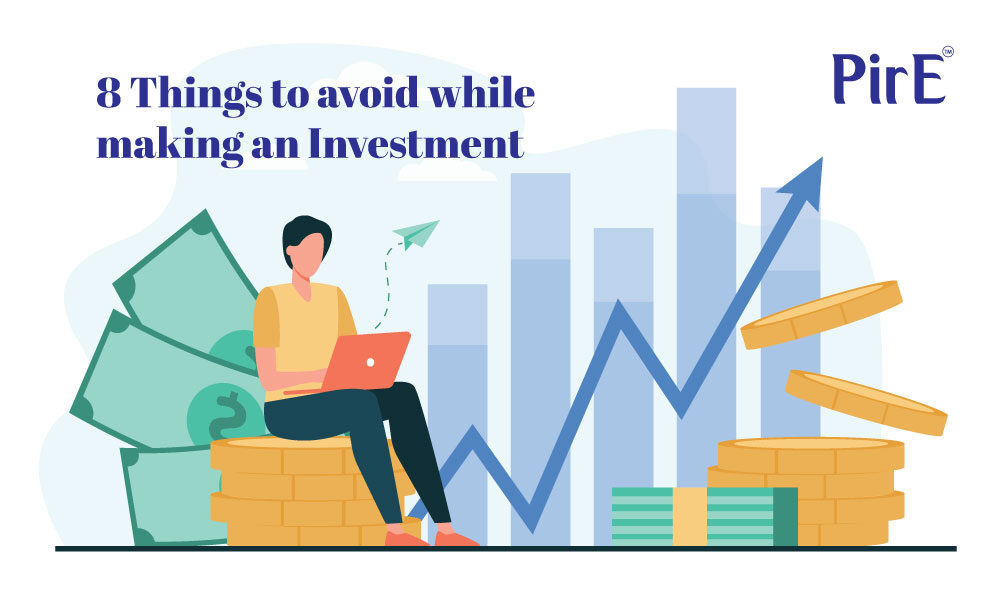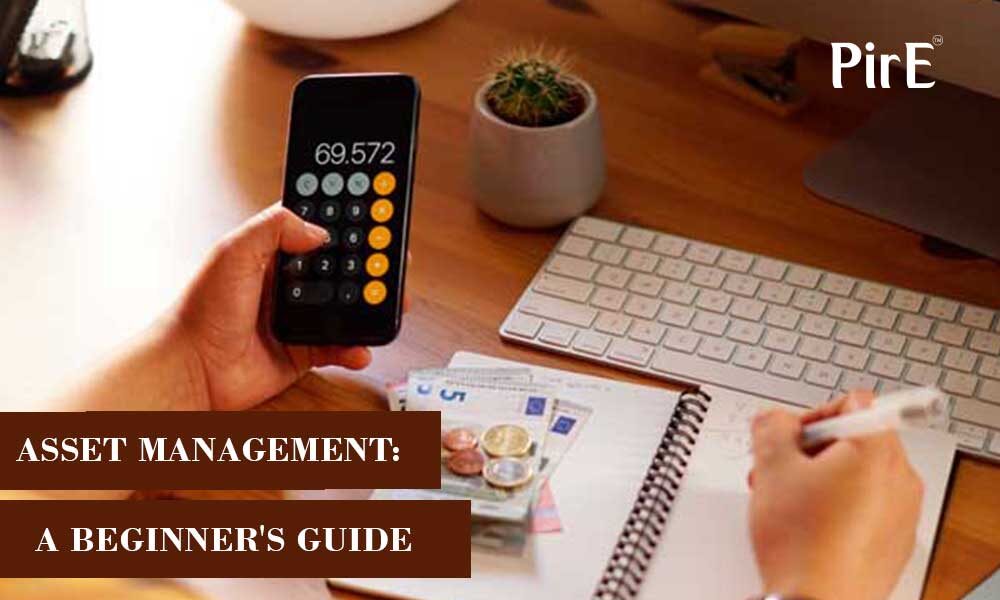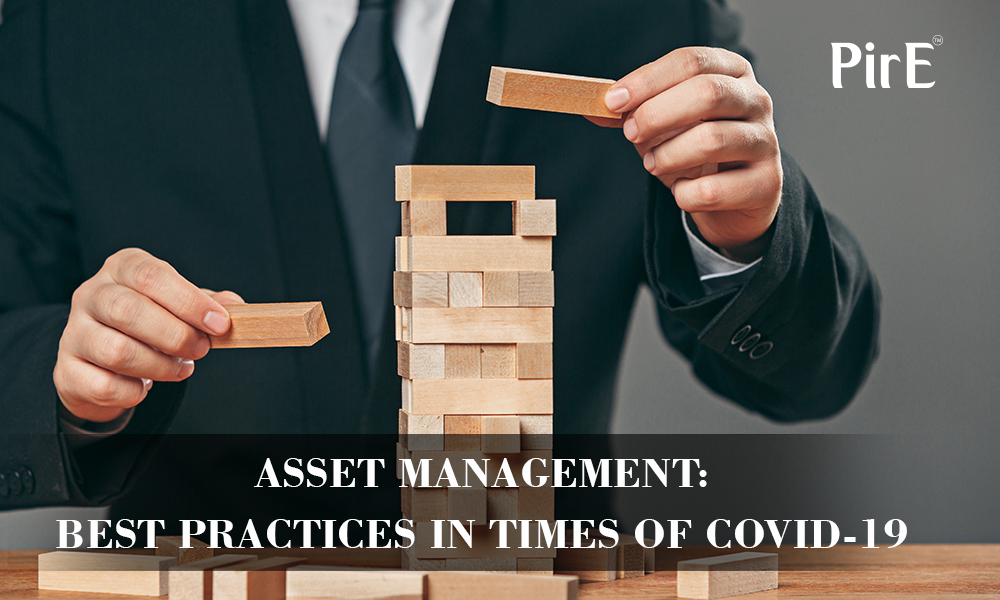Category: Blog
8 Things to avoid while making an Investment
Today each and every person does investments and most investments carry risk.
It is very common to make mistakes while investing, but making mistakes in an investment can cause you tons of money.
There are a few common mistakes that one can make when investing. Let’s get familiar with them and make them your advantages :
1. Insights of an investment
It is very important to understand the investment you are making. If you are investing in real estate you must know and understand the market, its conditions, its nature, and the location of the property. Do thorough research before investing in any type of investment or an asset.
2. Patience
Patience is an integral part of any investment process. You must know when to invest and when to take out your investment. Keep your head practical and logical while making the investment and during the investment also. Don’t keep your hopes too high. The investment won’t give you results in a single day, keep your calm and invest carefully.
3. Break-even
Holding an investment for a longer period of time, thinking the investment would recover the losses you suffered is a real mistake. When the value of the investment starts to decline and there is no going back, sell off the investment. Don’t hold on to the investment for long expecting the value of the investment would increase and give you returns.
4. Emotions
Several people let their emotions control their investment decisions.
For example- A person likes property in an area but the value of the investment keeps on declining. Such decisions can turn into nightmares and result in waste of your money.
Don’t ever let your emotions hamper your decision making while making an investment decision. Always take your decisions wisely based on facts and figures and avoid your emotions coming in your way.
5. Not planning your finances
It is important to analyze your present financial situation and your future financial position before making any kind of investment. Make a wise financial decision keeping in mind the right amount to be invested, if any interests are to be paid. If you don’t have sufficient finances, reach out to a bank.
6. Risk involved
Risk is uncertain hence it is very important to do a risk analysis before investing in any kind of property whether it’s the healthcare sector or real estate or even the manufacturing sector. Analyze if the property is worth the amount of investment, will the investment give potential returns or if there is any other safer option to invest in?
7. Tips
Never invest in any asset based on the tips you received from colleagues, friends or family. Any investment should be done only after thorough research.
8. Diversity
Diversity is the key. Never invest all your money into a single investment, as it is said: “ never put all your eggs in a single basket”. Having a healthy portfolio is very crucial, it will help you maintain a balance between risky investments and low-risk investments. At the time when your risky investments are not giving results, your low-risk investments will help you survive.
On the other hand, do not create chaos in your portfolio as it would become difficult to monitor the investments.
Making mistakes is a part of any process. But it is important to learn from those mistakes.
To avoid making the above mistakes you must prepare a systematic plan of your investments, the risks involved, the goal plan, the return on investment, nature of the investment. Each and every detail should be kept in mind before investing. Make sure you do not make the above mistakes.
All the best for your future investments. Pire Ventures is in your assistance through all your investments.
Comment your favourite type of investment in the comments section!!!
Asset Management: A beginner’s guide
The pandemic has altered the way we live. It has impacted our health, both physical and mental, and is well on its path to affecting our financial well-being as well. It’s worrisome, to say the least. But there’s always light at the end of the tunnel.
We, humans, love to dream a dream of a blessed future, where everything’s right and just the way we planned it. But, it doesn’t always work out. Does it? The restaurant we have been planning to open, the trip we’ve been wanting to go to, the piece of jewellery we have wanted to own – these plans, however outlandish they sound at the moment, could be successful.
How? you ask? Very simple: SECURE YOUR FUTURE.
Asset management is one of the keys to a financially healthy tomorrow. Most of us think of it as something that’s too technical and beyond our reach. For the longest time, the common idea was that asset management was for wealthy investors. To an extent, sure, but not anymore.
Small-time investors can rely on mutual funds, index funds, and exchange-traded funds to make prudent financial choices. Asset management firms, these days, have restructured in a way that they are able to extend their services to both rich and average investors.
Things to keep in mind if you’re a rookie and interested in asset management.
1. An asset management firm’s job is to direct the client’s money in the market. Earlier, they would deal with wealthy investors but those times are far behind now because smaller investors can join the bandwagon as well.
2. When assets are managed intelligently, it helps to create wealth, which means the client will be able to multiply his riches with his existing money. One can hire a financial advisor, independent or work for a firm, to help him/her understand the risk factors attached to investments and how best he/she can direct the wealth.
3. It helps one manage taxes efficiently. The ever-changing tax laws can come with a new set of rules every financial year and therefore, some of the previous years’ investments may not make sense. It’s imperative that one seeks professional help in order to keep his/ her wealth in shape.
4. Taking early retirement is a tempting idea but for some, it’s a distant dream. Private firms don’t have pension plans and therefore, those wanting to retire early should have enough wealth to last them a lifetime. Financial planners can assist one in setting up a guide or developing lucrative pension plans for a secure future.
On the surface, asset management might seem like a big word from the world of finances that we have decided to not understand but once you dig deep, it’s as simple as saving and creating money, albeit with the help of experts.
What’s the key takeaway here? People invest for varied reasons. Some love the adrenaline rush of the risk that investments come with, some are addicted to building wealth. But, you must function according to your financial needs and wants, and not what others are doing.
Warren Buffet once said: “The most important quality for an investor is temperament, not intellect. You need a temperament that neither derives great pleasure from being with the crowd or against the crowd.” So, let’s not forget. Whether your hire an asset manager or a firm to handle your wealth, your financial goals should clear as a bell.
Best asset management practices in times of COVID 19
‘Remember: When disaster strikes, the time to prepare has passed.’ – Steve Cyros. This is true, albeit to a certain extent. We’ll explain why. Read on to know more.
The economic ramifications of COVID-19 are incomprehensible. It has impacted people across physical and social boundaries. At this point, one might think one has lost all. And with the fractured financial structure across the board, it might seem like a massive challenge to pick oneself up from and get going. But, we are here to tell you that there’s light at the end of the tunnel.
Yes, we are living in uncertain times and have no clue what tomorrow holds for us, which makes strengthening existing assets and investing prudently more crucial. Companies are going into hibernation, factories have temporarily shut down, employment numbers have dipped, and it’s only natural to feel a strong sense of uncertainty but, there are always ways to overcome those hurdles.
To succeed during such unusual times, business owners must display the ability to adapt and improvise, provide its clients with a sense of stability, then and only then will there exist trust.
Leadership is crucial
Maintaining business stability is of prime importance, points out KMPG. A crisis-management team should be hired to assess the crisis. In doing so, everyone gets a clear picture of what’s to come, and in the process, the communication channels between the company and its clients are open and clear.
The financial landscape has been dented by the unprecedented spread of COVID-19. Therefore, combating the backlash will not be a walk in the park. This is why businesses should be ready with up-to-date information about where they are headed should their customers have pressing concerns about its direction. There is nothing more comforting for a confused client that timely response and accurate information.
Being flexible in times of crisis
No one thought COVID-19 will stick out like an eyesore, disrupt billions of lives across the globe, and impact each and everyone’s livelihood. To cut the long story short, anything can happen. And, what we did we learn from this overwhelming experience? Stay prepared for the worst, ALWAYS.
When firms partner up, they start a relationship that is based on trust. Along with money, sensitive data is exchanged, and it’s always advisable to devisable a system that puts data protection on priority. In addition to this, it always helps to keep one’s clients informed about how best and safely they can utilize the data they have had access to all this while.
The promise of stability
The times are rapidly changing, and there’s no way to know what the future holds. The volatility rate of markets is indescribable. During such times, it’s wise to always “review cash flow,” writes the site. Also, what helps immensely is to have a resilience plan in place and be open to the idea of identifying robust measures that could help clients adapt to the changing scenario.
Landlords can examine and monitor the financial health status of tenants, while real estate business owners should be ready to face longer vacancy periods as tenants would want to steer clear of occupying a new space at this time.
Give back
Finally, despite the challenges, give back. There’s nothing more reassuring than helping people in need. Put together an essential kit and donate across sectors that are worst it. It could be basic medical kits, food packets, clothes, and such.
Together we can fight the pandemic. Together, we are invincible!
- ‹ Previous
- 1
- 2
- 3
- 4



